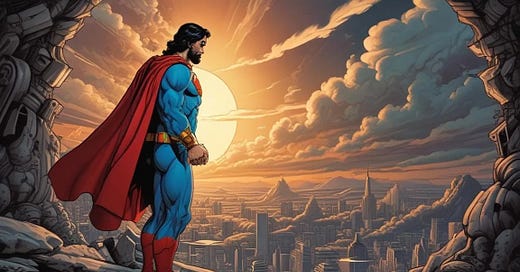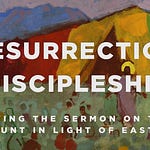Our scripture reading picks up where last week’s reading left off. The raising of Jairus’ daughter is part of a string of works done by Jesus that could be classified as "mighty works." Mighty works are things that Jesus did that no other human could do. Acts that reveal the mighty power of God. Jesus healed a woman who had been bleeding for 12 years and raised Jairus’ daughter, yet before those acts, Jesus had cast demons from a Gerasene demoniac, calmed a store, and done his early teaching. Now, Jesus has returned to his hometown.
At first glance, the scene painted by Mark is troubling but not troubling enough to cause concern for the reader. You see, the NRSV translation must include the original Greek's nuance. The Greek is rougher: “Where does this fellow get this stuff from? Where does he get off with this kind of business? Where does he get off claiming this sort of wisdom? Where does someone like him get this sort of wisdom? Where does someone we know, the kid down the block, come off doing this sort of thing? How does this work?” Still, Mark’s telling of the event does not sound as dire as the event might have been.
It's a sobering thought that even Jesus, the Son of God, faced rejection in his own hometown. Luke tells us Jesus was nearly killed when he taught in his hometown. This rejection, this lack of acceptance, is something many of us can relate to in our own lives.
“And he rolled up the scroll, gave it back to the attendant, and sat down. The eyes of all in the synagogue were fixed on him.”[i]
“All in the synagogue were filled with rage. They got up, drove him out of the town, and led him to the brow of the hill on which their town was built, so that they might hurl him off the cliff.”[ii]
The congregation was shocked, to say the least. It does not matter your accolades or accomplishments; when you return home, even if you are the Savior of the World, you still carry the accolades and accomplishments of your youth.
They say, "Who is this guy?
“Oh, I know him! He’s Joseph’s boy. He’s a nobody.”
I have preached twice in my home church as a guest preacher and the other for a wedding. On both occasions, after catching the old family friends up on my life, ministry, and family, the conversation would turn back to moments of nostalgia.
The skepticism of the congregation stems from a deeper issue. Jesus cannot be the one the prophet Isaiah wrote about because Jesus is human, after all. He’s Joseph and Mary’s boy. The issue lies with something other than Jesus' preaching but instead with the congregation's belief or lack thereof. They thought the Savior of the World was not, could never be, human. Jesus’ hometown was like many during this time, thinking the Savior of the World would need to be supped-up, be someone who is more human, someone whose powers go beyond anything they (we) could ever imagine. The synagogue congregation could not accept that someone they knew, someone as ordinary as Joseph and Mary’s boy, could perform the mighty works Jesus had already performed.
In their disdain for Jesus, the congregation revealed their disdain for their humanity.
We tend to not like ourselves and try to escape our humanity. In the 1980s, pastor and theologian Robert Capon received 20 rejection letters from 20 publishers for one book. Capon transposed the gospel into a narrative about Cleveland, Ohio. Capon said, “The narrator of the story, his name is Marvin Goodman, and he is the Saint Peter character. He happens to be in women's wear. The Jesus character is a cook in a northern Italian restaurant. People are antsy about that. Why? What's the difference between a cook and a carpenter? Not much. But we expect messiahs to be superhuman.”[iii]
At times, our expectations of Jesus are those of his hometown. We want a messiah who looks and acts more like a Marvel superhero than the messiah who rode into Jerusalem on Palm Sunday atop a borrowed burro. Sure, he can act and look like a normal human, but Jesus had better be able to do superhero stuff. Otherwise, we think there is no way he can tackle the mess we have created.
Robert Capon writes, “We have the idea that Jesus may look like Clark Kent on the outside, but somehow inside, he has secret souped-up powers that are not ours, and that he maybe hides those for a bit, only revealing them briefly for 33 years, and nearly gets himself done in by the kryptonite cross or whatever you want to call it. But then, finally, in the end, he goes into the phone booth of the empty tomb, puts on his Easter suit, and, with one leap, leaps back up to the planet heaven. All of which is bad theology, besides being silly.”[iv]
There's a reason Marvel and DC Comics continue to make the same movies again and again. We want someone who will swoop in and save us from our mess. We need someone more super than us to save us. But that is not Jesus.
Jesus did not have a super-secret divine power that slipped through his humanity. We believe Jesus is the true God and perfect human in one: fully divine and fully human. Jesus did what he did through the power of the Holy Spirit, sent by God the Father. This is how the church can be the body of Christ.
Jesus is not a supped-up comic book hero. No, in his humanity, he is like us.
A powerful series of commercials and advertising tells us that "He Gets Us." Jesus gets us. Now, setting aside the questionable funding for these ads (https://www.npr.org/2023/02/06/1154880673/jesus-commercial-super-bowl-billboard-he-gets-us-hobby-lobby-evangelical-billion) Jesus gets us because he lived our lives. He was born of Mary; he is Joseph’s son from Nazareth. He had friends, ate food, stubbed his toe, and so on.
Jesus' trip to his hometown was about something other than performing miracles on demand. The same demand will be made of him after he is nailed to the cross as he is mocked and told to save himself if he is truly the messiah.[v]
God knows how we are tempted and drawn to a superhero. We want leaders who can deliver on their over-promised promises while knowing they will disappoint. Perhaps this is why, as Jesus healed, he would tell the recipient to keep quiet. After he raised Jairus' daughter, Jesus said, “Don't tell anybody about this. Give her a peanut butter sandwich.”[vi]
When Jesus returned home, he could not perform enough works because the people’s familiarity breed contempt. And they would hear that the saving of humanity would not come through the mighty power they (we) expected.
The cross and resurrection of Christ are not “mighty” in the eyes of the world. The cross was a public spectacle of shame and defeat. The only way to know the cross as a mighty act is to have seen the resurrection. Yet, no one sees Jesus take his first steps out of the tomb. The resurrection is private, while the cross is public.
And here is where we find the good news of the gospel. If we, as Christ's body, want to do what Jesus did and what Jesus calls us to do, then we must embrace our humanity more than ever before. Jesus’ humanity was not a barrier but the very means by which God saved the world. Through the power of the Holy Spirit, our flesh and blood can also become a means of grace through which God continues to renew all creation.
Saint Paul captures this truth beautifully in his second letter to the Corinthians: “When I am weak, then I am strong.”[vii] Paul understood that true strength lies in embracing our humanity, with all its weaknesses, because it is there that God's power is made perfect.
Searching for a superhero savior misses the fact that God’s grace is revealed through our weaknesses, and God’s power is manifest through our humanity. The cross and resurrection teach us that God’s might is not in superhuman feats but in the humble, sacrificial love that transforms the world.
[i] Luke 4:20, NRSV
[ii] Luke 4:28-29, NRSV
[iii] Capon, Robert. “No Might Works” preached in the Duke Chapel on July 2, 1988. https://repository.duke.edu/dc/dukechapel/dcrmv001086
[iv] Ibid.
[v] Matthew 27:39-41
[vi] Mark 5:43
[vii] 2 Corinthians 12:10

















Share this post